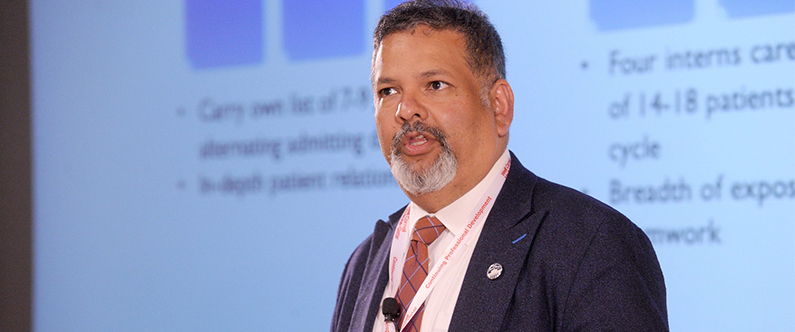Optimal learning environments discussed at WCM-Q Grand Rounds
 Dr. Jatin Vyas is program director of the internal medicine residency program at Harvard Medical School.
Dr. Jatin Vyas is program director of the internal medicine residency program at Harvard Medical School.
Strategies for creating optimal learning environments were discussed by a visiting expert at Weill Cornell Medicine-Qatar’s (WCM-Q) Grand Rounds.
Dr. Jatin M. Vyas, associate professor in medicine at Harvard Medical School - Massachusetts General Hospital (MGH), explained how educators can support the development of effective learning environments and identified commonly observed barriers to learning. Dr. Vyas, who is program director of the internal medicine residency program at Harvard Medical School – MGH, gave the lecture during a visit to WCM-Q as part of the college’s Visiting Professorship Program (VPP).
Drawing on his experiences as a residency program director, Dr. Vyas said: “Why do we focus on the learning environment? Because, if we are going to teach effectively, we must create spaces where learners have the opportunity to ask questions, and when we do this in the right way, we actually inculcate individuals into the noble profession that is medicine. When we do it the wrong way, we can end up having issues like burnout, cynicism, exhaustion, inefficiencies in the system, and so on. Indeed, patient errors can be attributable to this, so we really want to be sure that we are creating the right learning environment for residents.”
Dr. Vyas outlined seven key areas that operate in work-based learning environments, these being workload and job demands, control and flexibility, work-life integration, social support and community at work, organizational culture and values, efficiency and resources, and finding meaning in one’s work. He also stressed the importance of healthy working relationships.
“We think of the residency program as like a family in that we are all going through a set of intense experiences over a relatively short period of time,” he said. “In a residency program people can experience the highest of highs and the lowest of lows, so if we do that together as a shared learning experience, we are much better equipped to manage the challenges we encounter.”
The Visiting Professorship Program is a WCM-Q initiative that brings leading figures in medical education and healthcare to the college to view its state-of-the-art facilities and affiliate teaching hospitals, offer advice on career development to students and establish strong links between WCM-Q and other elite medical institutions. During his visit Dr. Vyas met with students to share his insights into applying to residency programs and answer their questions about the process. He also met with the clinical faculty in Hamad Medical Corporation and Sidra Medicine and had medical education and clinical discussions.
The lecture, titled ‘We All Contribute to the Learning Environment’, was accredited locally by the Qatar Council for Healthcare Practitioners-Accreditation Department and internationally by the Accreditation Council for Continuing Medical Education.